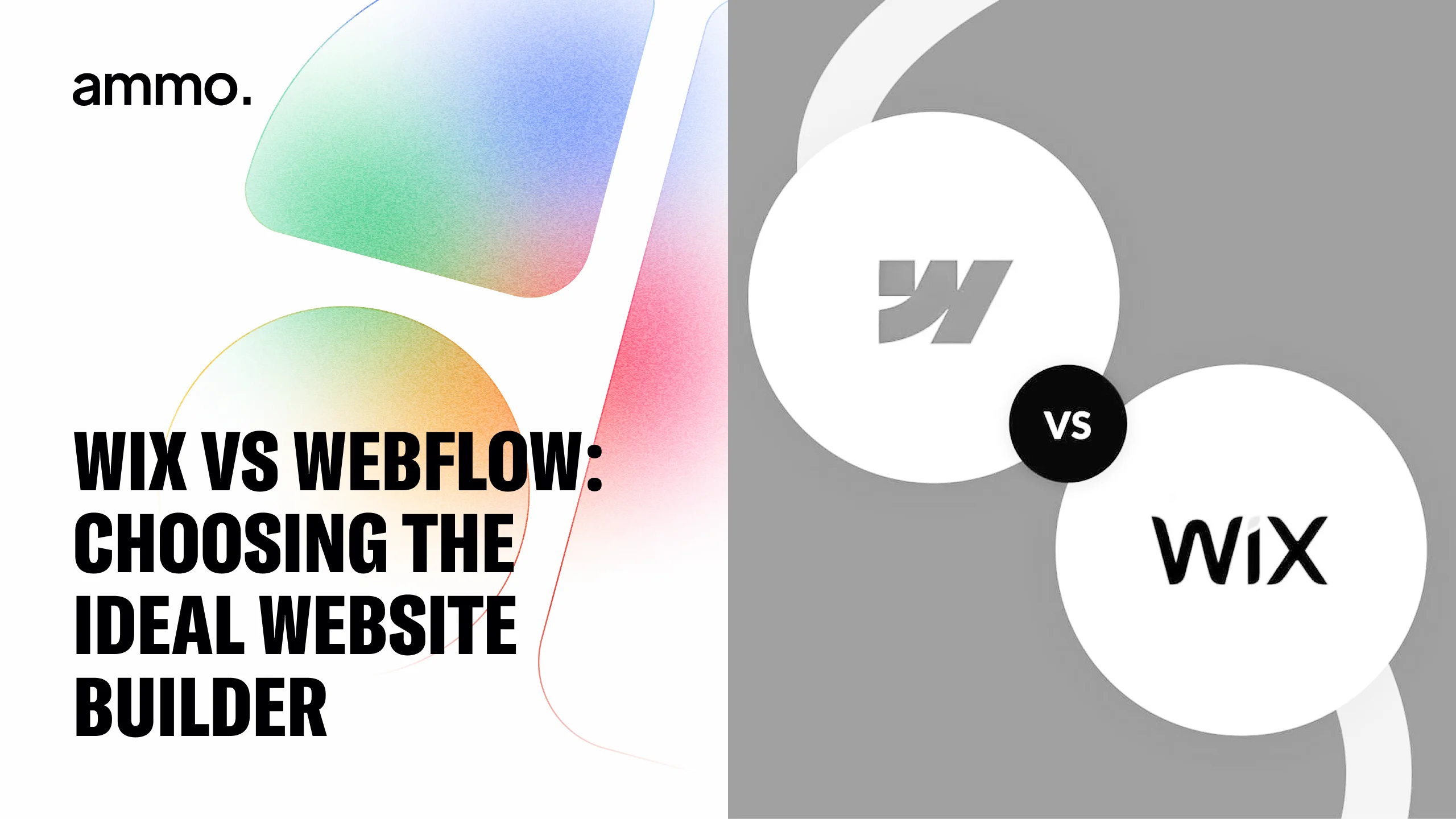Wix vs Webflow: Choosing the Ideal Website Builder

Wix vs Webflow: Choosing the Ideal Website Builder
In the digital age, having a website is essential for businesses and individuals alike. However, the process of building a website can be daunting, especially with the myriad of tools available. Two of the most popular website builders are Wix and Webflow, each catering to different needs and skill levels. This article delves into the features, advantages, and ideal users for both platforms, helping you make an informed decision.
Wix vs Webflow: Choosing the Right Website Builder
When selecting a website builder, it's crucial to consider the specific requirements of your project. Wix is known for its simplicity and user-friendly interface, making it an excellent choice for beginners or those who prefer a straightforward approach. On the other hand, Webflow offers a more complex environment, appealing to designers and developers who seek greater control over their site's design and functionality.
Both platforms have their unique strengths and weaknesses, which can impact the decision-making process. Understanding these differences can help you align your choice with your goals, whether you're creating a personal blog, an e-commerce site, or a portfolio.
Wix boasts a vast library of templates and an intuitive drag-and-drop editor that allows users to customize their sites with ease. This feature is particularly beneficial for those who may not have extensive coding knowledge, as it empowers them to create visually appealing websites without the need for technical skills. Additionally, Wix offers a range of integrated tools, such as SEO optimization and social media sharing, which can help users enhance their online presence and reach a wider audience.
Conversely, Webflow stands out with its powerful design capabilities and flexibility. It allows users to build responsive websites that can adapt seamlessly to various screen sizes, ensuring a consistent user experience across devices. Webflow's CMS functionality is particularly advantageous for content-heavy sites, as it enables users to create custom content structures and manage their data efficiently. Moreover, for those familiar with coding, Webflow provides the ability to add custom code, giving developers the freedom to implement advanced features and tailor their websites to meet specific needs.
Overview of Webflow
Webflow is a powerful website builder that combines design, development, and content management into one platform. It allows users to create responsive websites without writing code, although having some technical knowledge can enhance the experience. Webflow’s focus on design flexibility and advanced features makes it a popular choice among professionals. With its intuitive interface and comprehensive toolset, Webflow empowers users to bring their creative visions to life, whether they're building a personal blog or a complex corporate site.

Key Features of Webflow
One of the standout features of Webflow is its visual editor, which allows users to design websites in a way that closely resembles how they will appear when published. This real-time editing capability is complemented by a robust CMS that enables users to manage content dynamically. Additionally, Webflow supports e-commerce functionality, making it suitable for businesses looking to sell products online. Users can easily set up product pages, manage inventory, and even integrate payment gateways, all while maintaining complete control over the design and user experience.
Design Flexibility and Customization
Webflow stands out for its design flexibility. Users can create custom layouts using a grid system, manipulate elements with CSS, and implement animations and interactions without needing extensive coding knowledge. This level of customization allows for unique designs that can set a website apart from competitors. Furthermore, Webflow's library of pre-built components and templates can serve as a springboard for users, enabling them to kickstart their projects with professionally designed elements that can be easily tailored to fit specific branding needs.
Advanced CMS Capabilities
The CMS in Webflow is particularly noteworthy. It allows users to create custom content types, making it easy to manage blogs, portfolios, or any other content-driven site. This feature is beneficial for businesses that need to update their content regularly, as it streamlines the process and keeps everything organized. Moreover, Webflow’s CMS integrates seamlessly with its design capabilities, allowing users to create dynamic content that can automatically populate across multiple pages, ensuring consistency and saving time. Users can also leverage custom fields to add metadata and SEO attributes, further enhancing their site's visibility in search engines.
Collaboration and Workflow
Another significant advantage of Webflow is its collaborative features, which facilitate teamwork among designers, developers, and content creators. Users can invite team members to collaborate on projects in real-time, making it easy to share feedback and iterate on designs. This collaborative environment is particularly beneficial for agencies and larger teams, where multiple stakeholders may need to contribute to a single project. Additionally, Webflow offers version control, allowing users to track changes and revert to previous versions if necessary, ensuring that the design process remains smooth and efficient.
Hosting and Performance
Webflow also provides robust hosting solutions, ensuring that websites are not only visually appealing but also perform optimally. With features like automatic backups, SSL certification, and global CDN support, Webflow guarantees that sites load quickly and securely. This is particularly important for e-commerce sites, where performance can directly impact sales and user experience. Users can also take advantage of Webflow’s built-in SEO tools, which help optimize their sites for search engines, enhancing visibility and driving organic traffic.
Overview of Wix
Wix is a well-established website builder that caters primarily to users looking for an easy and intuitive way to create a website. With a drag-and-drop interface, Wix allows users to build a site quickly, making it ideal for those with little to no technical skills.

User-Friendly Interface and Ease of Use
The hallmark of Wix is its user-friendly interface. The drag-and-drop functionality enables users to add elements such as images, text, and videos effortlessly. This simplicity allows even the most inexperienced users to create a professional-looking website without feeling overwhelmed. Additionally, Wix provides a comprehensive tutorial library and customer support, ensuring that users can find assistance whenever they encounter challenges during the website creation process. This level of support further enhances the platform's accessibility, making it an attractive option for those venturing into web design for the first time.
Template Variety and Customization Options
Wix offers a vast library of templates across various categories, providing users with a solid starting point for their website. These templates are fully customizable, allowing users to adjust colors, fonts, and layouts to match their brand identity. This combination of variety and customization makes Wix a popular choice for small businesses and individuals. Furthermore, Wix regularly updates its template offerings, ensuring that users have access to the latest design trends and styles. This commitment to innovation means that users can create modern, visually appealing websites that stand out in a crowded digital landscape. The platform also includes advanced design features such as animations and video backgrounds, which can further enhance the user experience and engagement on their sites.
Feature Comparison: Webflow vs Wix
When comparing Webflow and Wix, it's essential to examine the features that matter most to your project. Both platforms have unique strengths that cater to different user needs.
Design and Development Tools
Webflow excels in design and development tools, offering a more sophisticated environment for users who want granular control over their website's aesthetics and functionality. In contrast, Wix prioritizes ease of use, providing tools that are straightforward and accessible to everyone. This means that while Webflow users can create highly customized designs with animations and interactions, Wix users can quickly build a functional site using drag-and-drop features without needing extensive technical knowledge. For those who appreciate a hands-on approach to web design, Webflow's responsive design capabilities allow for intricate adjustments across different devices, ensuring a seamless user experience.
SEO and Marketing Features
Both platforms offer SEO capabilities, but they differ in complexity. Webflow provides advanced options for optimizing site performance, including custom meta tags and clean code, which can enhance search engine rankings. Wix, while user-friendly, may not offer the same level of depth in SEO features, making it more suitable for users who prefer a simpler approach. Additionally, Webflow's integration with Google Analytics allows for in-depth tracking of user behavior, enabling marketers to make data-driven decisions. On the other hand, Wix includes built-in SEO tools that guide users through the optimization process, making it an excellent choice for small business owners who may not have the time or expertise to dive into more complex strategies. Furthermore, both platforms support social media integration, allowing users to promote their content effectively across various channels, which is crucial in today's digital landscape.
Advantages and Disadvantages
Understanding the advantages and disadvantages of each platform is crucial in making an informed decision.
Benefits of Using Webflow
Webflow's primary benefits include its design flexibility, advanced CMS capabilities, and robust SEO features. These aspects make it an excellent choice for designers and developers who want to create unique, high-quality websites. Additionally, the ability to export code can be beneficial for those looking to transition to a more traditional development environment in the future. Webflow also offers a powerful visual editor that allows users to build responsive designs without writing code, which can significantly speed up the design process. This feature is particularly advantageous for teams that need to collaborate on projects, as it allows for real-time updates and adjustments.
Moreover, Webflow’s hosting services are optimized for performance, ensuring that websites load quickly and efficiently. This is particularly important for user experience and SEO, as page speed is a ranking factor for search engines. The platform also integrates seamlessly with various third-party tools and services, such as Google Analytics and Mailchimp, allowing users to enhance their website's functionality and track performance metrics effectively. With a strong community and extensive resources available, users can easily find tutorials and forums to help them navigate any challenges they may encounter.
Benefits of Using Wix
Wix's advantages lie in its simplicity and extensive template library. The platform is perfect for users who want to create a website quickly without delving into complex design elements. Moreover, Wix's customer support and resources make it easy for users to find help when needed. The drag-and-drop interface is intuitive, allowing even those with minimal technical skills to design a professional-looking site in a matter of hours. This ease of use is particularly appealing for small business owners and entrepreneurs who may not have the time or resources to invest in extensive web development.
In addition to its user-friendly design tools, Wix offers a variety of features that cater to different industries, such as e-commerce, portfolios, and blogs. This versatility makes it a popular choice for a wide range of users, from artists showcasing their work to businesses looking to sell products online. Wix also provides built-in marketing tools, including email marketing and social media integration, helping users promote their websites effectively. With regular updates and new features being added, Wix continues to evolve and meet the changing needs of its users, ensuring that they have access to the latest tools and technologies for their online presence.
Ideal Users for Each Platform
Identifying the ideal users for each platform can help narrow down the best choice for specific needs.
Best Fit for Designers and Developers
Webflow is particularly well-suited for designers and developers who seek a high level of customization and control. Its advanced features allow for the creation of intricate designs that can be tailored to specific requirements, making it a go-to choice for professionals in the field.
Best Fit for Small Business Owners
Wix, with its user-friendly interface and extensive template options, is ideal for small business owners who want to establish an online presence quickly. The simplicity of the platform allows them to focus on their business rather than getting bogged down in technical details.
Frequently Asked Questions
Addressing common questions can help clarify the differences between Webflow and Wix.

Which is Better: Webflow or Wix?
The answer to this question largely depends on the user's needs and skill level. For those seeking advanced design capabilities and customization, Webflow is likely the better choice. Conversely, for users who prioritize ease of use and quick setup, Wix may be more suitable.
Can Webflow Integrate with Other Tools?
Yes, Webflow offers integrations with various tools, including marketing platforms, analytics services, and e-commerce solutions. This capability allows users to enhance their website's functionality and streamline their workflows.
Key Differences Highlighted on Reddit
Discussions on platforms like Reddit often highlight the differences between Webflow and Wix, emphasizing Webflow's design capabilities and Wix's user-friendliness. Users frequently share their experiences, providing insights into how each platform meets specific needs.
What Makes Webflow Stand Out?
Webflow stands out due to its combination of design flexibility, advanced CMS features, and the ability to create custom interactions. This makes it a preferred choice for professionals who want to push the boundaries of web design.
Final Thoughts and Recommendations
Choosing between Wix and Webflow ultimately depends on individual needs, technical skills, and the specific goals of the website. For those looking for a straightforward, easy-to-use platform, Wix is an excellent choice. However, for users seeking advanced design capabilities and greater control, Webflow is the way to go.
Regardless of the choice made, both platforms offer valuable tools for creating a website. For those needing assistance in navigating these options or seeking additional support, our company is here to help. With expertise in both platforms, we can guide you in selecting the right solution for your project and ensure a smooth website building experience.
Ready to Elevate Your Online Presence with Webflow?
If you're inspired to harness the advanced capabilities of Webflow for your next project, Ammo Studio is here to turn your vision into reality. As a dedicated Webflow agency, we specialize in crafting pixel-perfect, custom, and scalable websites that not only captivate your audience but also drive results. Our commitment is to tailor solutions that elevate your brand, improve visitor conversion, and amplify your marketing strategies. Don't settle for less – Book A Call with us today and let's create a web experience that stands out!
Table of contents

Looking for solution for your company?
Got questions for us? We got you!
Let’s Build What’s Next
Whether you're building your first product or evolving a mature platform, we’d love to help you craft what’s next.
.webp)

.webp)

.webp)